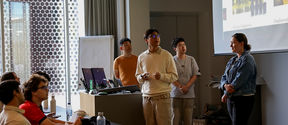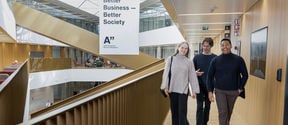Winter School social programme and events
Discover the amazing people in your class and uncover the wonders of Finland with exciting extracurricular activities.

Sustainable development requires a fundamental shift in the way resources are used in our economic system. Instead of continuing a linear economic model where resources are used and discarded, we need to shift to a circular economy model where economic value is created through the circular use of resources. The transition towards a circular economy has fundamental implications for businesses and other organizations.
Furthermore, the transition to circular economy does not only ask ‘what should be done?’, but urges to ask, ‘how are we thinking?’. Systems thinking is an essential part of circular economy, as it identifies the interconnectivity of economic, political, social, and ecological systems.
A circular economy offers a wide range of opportunities that can provide economic and supply chain advantages to organisations and value to the customer. In this introductory course to circular economy, you will:
Know-how in designing and developing circular business models and value chains will be an asset in various organizations and sectors, for example, in the largest waste-creating industries, such as the textile, food, and construction industries. As circular solutions become more widespread, knowing how to tackle the pitfalls of circularity is essential for future professionals across disciplines.

Discover the amazing people in your class and uncover the wonders of Finland with exciting extracurricular activities.

Tim von Ass, Summer School alum and a Business Administration student at the University of Hamburg, has focused his studies on business information systems and supply chain management. Attracted by Finland’s leading position in the circular economy, he enrolled in the Circular Economy course at Aalto University Summer School.

The Circular Economy course taught Dominika Kwasková new perspectives in both the business world and in working with a diverse group.
Contact sessions 13 – 24 January 2025
Contact sessions are on Monday-Friday mornings (9 am – 12 pm).
| WEEK 1 | Monday 13 January | Tuesday 14 January | Wednesday 15 January | Thursday 16 January | Friday 17 January |
|---|---|---|---|---|---|
| Morning (9-12) | Course session | Course session | Course session | Course session | Course session |
| Afternoon & evening | Optional social event | Optional social event | Optional social event |
| WEEK 2 | Monday 20 January | Tuesday 21 January | Wednesday 22 January | Thursday 23 January | Friday 24 January |
|---|---|---|---|---|---|
| Morning (9-12) | Course session | Course session | Course session | Course session | Course session |
| Afternoon & evening | Optional social event | Optional social event | Optional social event |
In this introductory course to circular economy, you will:
The planned workload is 2 ECTS (54h), roughly divided into 30h of contact sessions (teaching and workshops) and 24h of students’ individual or teamwork, which can include lecture preparation and e.g., reflection assignments. Details regarding assignments to come later this spring.
The course is graded as pass/fail.
Please note that the undergraduate courses offered by Aalto University Summer School can not be included in Aalto degree studies.
You must have completed a high school or vocational degree or equivalent by the time the course starts. However, you do not have to be a degree student at a university to participate in our courses.
Additionally, all summer school course students must be 18 years or older, as it is the legal age in Finland.
This course does not require previous experience in the topic.
In your motivation letter, describe your motivation for taking this course. The recommended length for the motivation letter is 150-250 words.
More information about the motivation letter and application processMore information about the travel arrangements
One course: 1170€ (incl. VAT 25,5%)
Learn about the Aalto University Summer School cancellation terms. You will receive the full terms before making the payment and confirming the course participation.

Dr. Iqra Khan is a post-doctoral researcher at Aalto University's School of Business, working on the Finix project, which focuses on sustainable textile systems. She earned her doctoral degree in Industrial Engineering and Management from the University of Oulu, Finland.
Iqra holds Master's degrees in Education and Globalization and Management Science from the University of Oulu, Finland and RIPHAH International University, Islamabad, Pakistan. Her research focuses on Industry 4.0, sustainable development, digitalization, and innovation ecosystems, contributing both to academic knowledge and practical advancements for a sustainable future.
She recently completed a visiting scholar position at Stanford University as part of the SCANCOR program which added to her prior experience as a visiting scholar at the Spanish National Research Council (CSIC).

Join the Aalto University Winter School in January 2025. The application period is open from 1 October to 15 November 2024.

The School of Business is one of five business schools in the world to get the Financial Times recognition